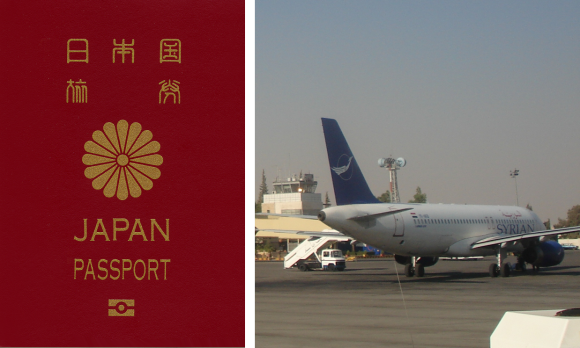
Japan’s Foreign Ministry has come under fire for confiscating the passport of a journalist who was intending to travel to Syria. War correspondent Yuichi Sugimoto, 58, was planning to visit Syria to cover events in refugee camps later this month, but was ordered to surrender his travel documents to authorities.
Under Japanese law, the ministry can confiscate a person’s passport to protect their life, but this is the first time the law has actually been used. Critics say the action contravenes the constitutional guarantee of freedom of movement and foreign travel.
Sugimoto, of Niigata in central Japan, had previously been asked by the ministry and Japanese police not to travel to Syria. The freelance photographer and war journalist, who has over twenty years’ experience, planned to leave Japan for the war-torn country on February 27th.
He was visited by police on Saturday and told he would be arrested if he did not surrender his passport. He complied in order to avoid arrest, he said, adding:
“I will avoid reckless activities and take enough measures to protect myself … I want to go to Syria early and let people know what’s happening in the country.”
Calling the confiscation of his passport “outrageous”, Sugimoto said that the ministry’s actions were a violation of his rights. Freedom of movement, including foreign travel, is codified in the Japanese constitution.
Chief cabinet secretary Yoshihide Suga told a press briefing that, after the execution of two Japanese hostages by Islamist extremists in Syria last month, “if a Japanese national enters Syria … there is a high risk that the person would face immediate danger to his life, like being captured by ISIL or other Islamic extremists.”
Suga stressed that the government has a responsibility to protect Japanese nationals. “The Islamic State has expressed its resolve to continue killing Japanese,” he added.
Sources: zakzak, Jiji Press (1, 2), Japan Times, The Guardian
Image: Wikimedia/Muttley, Wikimedia/Danij84 (edited by RocketNews24)

 Japanese student suspected of planning to join Islamic State fighters in Syria
Japanese student suspected of planning to join Islamic State fighters in Syria Japanese passport ranks yet again as the most mobile in the world in 2023
Japanese passport ranks yet again as the most mobile in the world in 2023 Pakistani Japanese citizen is tired of the cops asking him for his foreign resident card
Pakistani Japanese citizen is tired of the cops asking him for his foreign resident card Gov’t considering to change Japanese passport design by 2020
Gov’t considering to change Japanese passport design by 2020 Japan to begin process of distributing vaccine passports, Chief Cabinet Secretary says
Japan to begin process of distributing vaccine passports, Chief Cabinet Secretary says McDonald’s new Happy Meals offer up cute and practical Sanrio lifestyle goods
McDonald’s new Happy Meals offer up cute and practical Sanrio lifestyle goods More foreign tourists than ever before in history visited Japan last month
More foreign tourists than ever before in history visited Japan last month Starbucks reopens at Shibuya Scramble Crossing with new look and design concept
Starbucks reopens at Shibuya Scramble Crossing with new look and design concept Is the new Shinkansen Train Desk ticket worth it?
Is the new Shinkansen Train Desk ticket worth it? Dogs now allowed on Catbus! Ghibli Park vehicles revise service animal policy
Dogs now allowed on Catbus! Ghibli Park vehicles revise service animal policy Randomly running into a great sushi lunch like this is one of the best things about eating in Tokyo
Randomly running into a great sushi lunch like this is one of the best things about eating in Tokyo Our reporter takes her 71-year-old mother to a visual kei concert for the first time
Our reporter takes her 71-year-old mother to a visual kei concert for the first time Princesses, fruits, and blacksmiths: Study reveals the 30 most unusual family names in Japan
Princesses, fruits, and blacksmiths: Study reveals the 30 most unusual family names in Japan Tokyo’s most famous arcade announces price increase, fans don’t seem to mind at all
Tokyo’s most famous arcade announces price increase, fans don’t seem to mind at all Hey, Japanese taxi driver! Take us to your favorite restaurant in Tsuruga City!
Hey, Japanese taxi driver! Take us to your favorite restaurant in Tsuruga City! Disney princesses get official manga makeovers for Manga Princess Cafe opening in Tokyo
Disney princesses get official manga makeovers for Manga Princess Cafe opening in Tokyo We try out “Chan Ramen”, an underground type of ramen popular in the ramen community
We try out “Chan Ramen”, an underground type of ramen popular in the ramen community Foreign English teachers in Japan pick their favorite Japanese-language phrases【Survey】
Foreign English teachers in Japan pick their favorite Japanese-language phrases【Survey】 Beautiful new Final Fantasy T-shirt collection on the way from Uniqlo【Photos】
Beautiful new Final Fantasy T-shirt collection on the way from Uniqlo【Photos】 There’s a park inside Japan where you can also see Japan inside the park
There’s a park inside Japan where you can also see Japan inside the park New Studio Ghibli bedding sets are cool in all senses of the word
New Studio Ghibli bedding sets are cool in all senses of the word Japanese convenience store packs a whole bento into an onigiri rice ball
Japanese convenience store packs a whole bento into an onigiri rice ball Hanton rice — a delicious regional food even most Japanese people don’t know about, but more should
Hanton rice — a delicious regional food even most Japanese people don’t know about, but more should New Pokémon cakes let you eat your way through Pikachu and all the Eevee evolutions
New Pokémon cakes let you eat your way through Pikachu and all the Eevee evolutions Hamburg and Hamburg Shibuya: A Japanese restaurant you need to put on your Tokyo itinerary
Hamburg and Hamburg Shibuya: A Japanese restaurant you need to put on your Tokyo itinerary Studio Ghibli releases Kiki’s Delivery Service chocolate cake pouches in Japan
Studio Ghibli releases Kiki’s Delivery Service chocolate cake pouches in Japan Japan’s bone-breaking and record-breaking roller coaster is permanently shutting down
Japan’s bone-breaking and record-breaking roller coaster is permanently shutting down New definition of “Japanese whiskey” goes into effect to prevent fakes from fooling overseas buyers
New definition of “Japanese whiskey” goes into effect to prevent fakes from fooling overseas buyers Foreign passenger shoves conductor on one of the last full runs for Japan’s Thunderbird train
Foreign passenger shoves conductor on one of the last full runs for Japan’s Thunderbird train Our Japanese reporter visits Costco in the U.S., finds super American and very Japanese things
Our Japanese reporter visits Costco in the U.S., finds super American and very Japanese things Kyoto bans tourists from geisha alleys in Gion, with fines for those who don’t follow rules
Kyoto bans tourists from geisha alleys in Gion, with fines for those who don’t follow rules Studio Ghibli unveils Mother’s Day gift set that captures the love in My Neighbour Totoro
Studio Ghibli unveils Mother’s Day gift set that captures the love in My Neighbour Totoro Domino’s Japan now sells…pizza ears?
Domino’s Japan now sells…pizza ears? New Japanese KitKat flavour stars Sanrio characters, including Hello Kitty
New Japanese KitKat flavour stars Sanrio characters, including Hello Kitty Kyoto creates new for-tourist buses to address overtourism with higher prices, faster rides
Kyoto creates new for-tourist buses to address overtourism with higher prices, faster rides Sales of Japan’s most convenient train ticket/shopping payment cards suspended indefinitely
Sales of Japan’s most convenient train ticket/shopping payment cards suspended indefinitely Sold-out Studio Ghibli desktop humidifiers are back so Totoro can help you through the dry season
Sold-out Studio Ghibli desktop humidifiers are back so Totoro can help you through the dry season Japanese government to make first change to romanization spelling rules since the 1950s
Japanese government to make first change to romanization spelling rules since the 1950s Ghibli founders Toshio Suzuki and Hayao Miyazaki contribute to Japanese whisky Totoro label design
Ghibli founders Toshio Suzuki and Hayao Miyazaki contribute to Japanese whisky Totoro label design Doraemon found buried at sea as scene from 1993 anime becomes real life【Photos】
Doraemon found buried at sea as scene from 1993 anime becomes real life【Photos】 Tokyo’s most famous Starbucks is closed
Tokyo’s most famous Starbucks is closed One Piece characters’ nationalities revealed, but fans have mixed opinions
One Piece characters’ nationalities revealed, but fans have mixed opinions We asked a Uniqlo employee what four things we should buy and their suggestions didn’t disappoint
We asked a Uniqlo employee what four things we should buy and their suggestions didn’t disappoint Studio Ghibli’s new desktop Howl’s Moving Castle will take your stationery on an adventure
Studio Ghibli’s new desktop Howl’s Moving Castle will take your stationery on an adventure MLB pitcher Yu Darvish throws a curveball of sensibility into the Yasuda hostage controversy
MLB pitcher Yu Darvish throws a curveball of sensibility into the Yasuda hostage controversy “Eyes are closed”: Asian man’s passport photo denied
“Eyes are closed”: Asian man’s passport photo denied The strongest passport in the world! Which nation’s citizens can freely visit the most countries?
The strongest passport in the world! Which nation’s citizens can freely visit the most countries? Japan’s passport is the strongest in the world, study shows
Japan’s passport is the strongest in the world, study shows Getting stopped by the police in Japan – how often does it happen (and why?)
Getting stopped by the police in Japan – how often does it happen (and why?) Japanese man breaks into school to recover stuff teacher took from him…over 40 years ago
Japanese man breaks into school to recover stuff teacher took from him…over 40 years ago Japanese man pretends to visit Muji stores 5.62 million times in six weeks, gets arrested again
Japanese man pretends to visit Muji stores 5.62 million times in six weeks, gets arrested again Japan to begin accepting tourists from the U.S., three other countries this month
Japan to begin accepting tourists from the U.S., three other countries this month 27-year-old in Japan arrested for 3-D printed pistol, says he didn’t know it was illegal
27-year-old in Japan arrested for 3-D printed pistol, says he didn’t know it was illegal Weak yen should have Japan fast-tracking reopening to foreign tourists, prominent politician says
Weak yen should have Japan fast-tracking reopening to foreign tourists, prominent politician says Former police drug investigator arrested for drug possession, claims he didn’t know it was drugs
Former police drug investigator arrested for drug possession, claims he didn’t know it was drugs Japanese panty thief steals over 700 pieces of underwear from coin laundry before finally caught
Japanese panty thief steals over 700 pieces of underwear from coin laundry before finally caught Terrorists release third video of Japanese hostage, say it will be his last
Terrorists release third video of Japanese hostage, say it will be his last Man, inspired by IS video, threatens to behead ex-girlfriend
Man, inspired by IS video, threatens to behead ex-girlfriend High-level yakuza member arrested for possession of 17kg of salt
High-level yakuza member arrested for possession of 17kg of salt
Leave a Reply